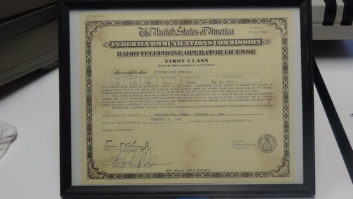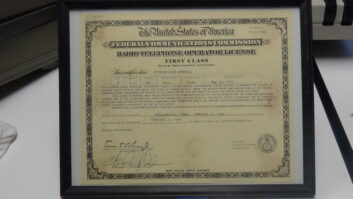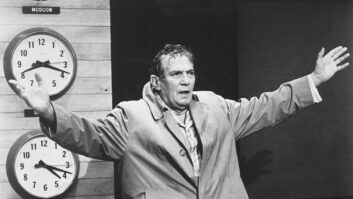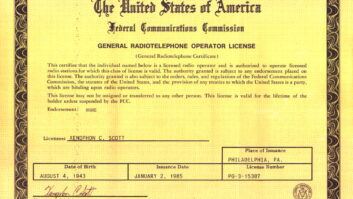Have you noticed a trend in how qualification problems are addressed inside the Beltway over the last 50 years or so? In Washington, it seems, when enough people can’t reach the qualification bar, they just lower the bar. Do away with the problem by the stroke of a pen; eliminate the requirement.
Ohhhh, if only we were so all-powerful! We would do away with taxes, reruns on TV and marriage (I must be crazy), among other things.
In our industry, the notable instance of this phenomenon was the disappearance of the Radio Telephone Operator License First Class, the possession of which was a long-standing requirement if you hoped to find meaningful and gainful employment in radio engineering.
Let’s be clear. The FCC only licenses operators; it never licensed engineers engaged in intrastate commerce, professional or stationary. The commission never intended that one would have to operate high-pressure boilers or a power plant or design the foundations under your towers. Licensing of professional and stationary engineers is a power held only by the states.
Boilers aside, that still leaves us ordinary mortals who build and maintain broadcast systems in a profession of profound scope and need. Every station has a lot of meaningful technical matters at hand, routine and otherwise.
Push to talk
The FCC licensing structure through the early 1960s was simple. In general terms, if you wanted to speak on a two-way radio, you needed a Radio Telephone Third Class Operator Permit. A classic example was the police radio dispatcher. He could push a transmit button on his big base station. Because he theoretically was supervising the system, his unlicensed police officers in their patrol cars could push the buttons on their mobile mics and speak back.
The holder of a “Third” couldn’t service or install any transmitter equipment. If you wanted to service and install communications-level transmitters or certain safety devices, you had to hold at least a Radio Telephone Operator License Second Class. One had to pass the Third exam before you could attempt the Second.
Broadcast was considered the highest level of importance (oh, how the mighty have fallen) and the most complex; you needed a First to operate and maintain broadcast transmitters. Again, you had to have passed the Third and Second exams to attempt the First.
Prior to 1963, all broadcast stations were to be maintained and operated only by First holders.
From 1963 through 1973, as a sop to owners, FM and 10 kW or less non-directional AM stations were allowed to be operated by a First, a Second or the holder of a hybrid sort of license, a broadcast-endorsed Third.
With that in hand, you could turn the transmitter on and off, take and sign the operating log and adjust power to stay within limits, but you could not maintain the transmitter with a Third.
After 1973, all classes of broadcast stations were allowed to be operated by an “Endorsed Third.”
In the 1980s, the commission sailed through a sea change of regulation. A basic premise was that the holder of the station license ultimately was responsible for the proper operation of the station.
On Jan. 5, 1979, the FCC eliminated the Third requirement, as well as the license grade, and allowed holders of Restricted Radiotelephone Permits (just fill out a form and mail it in) to operate broadcast transmitters of nearly all classes and powers.
This requirement ultimately was dropped; now no operating license at all is needed for local or remote controlled stations. Responsibility for proper operation at this time falls completely to the station owner.
Equity trap
In my rear-view mirror, I think the major reason the “First” disappeared was a basic flaw: The test process used a set question base that could be co-opted. This left industry with an exam that could be passed by memorization, detracting from the value of the license as a proof that a person knew something about what they were doing.
In other professions, comparable licensing also is done through exams with a set syllabus of concepts addressed; however, the tests do not ask the same questions each time. This “equity” trap – dumbing up the exam – is a flaw that the SBE certification process, the industry’s own replacement for the First’s proof of knowledge, has so far been able to avoid, in my estimation.
All numbered classes of radiotelephone licenses were eliminated on Aug. 7, 1981, when the FCC established the General Radiotelephone Operator License (PG) and ceased to issue First and Second Class Operator Licenses. A single omnibus grade of license, the “General,” remains, required mainly for the repair of non-broadcast communications equipment.
In the dim long ago, the “license wall” at a radio station’s transmitter site was a special place, reserved for FCC licenses. As a youngster I visited one large station where all the soft blue-colored First licenses were arranged in seniority, like steps on a pyramid, leading to the large white primary station license at the top.
License walls are long gone. Hopefully the pride in our profession remains.
Share your memories of your FCC licenses. E-mail radioworld@futurenet.com.





